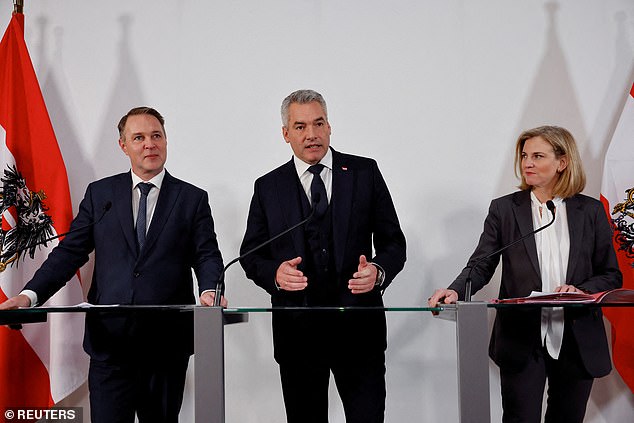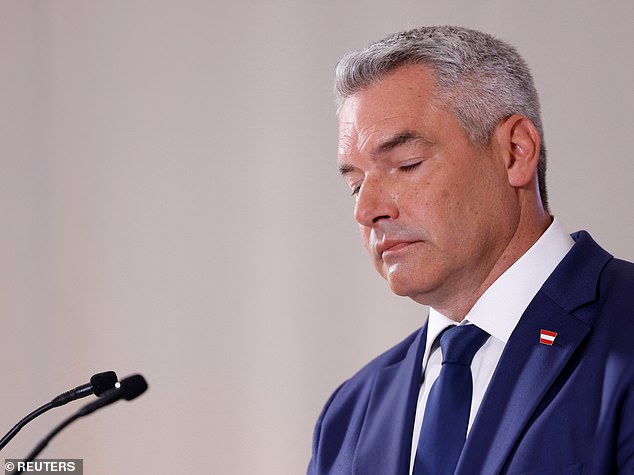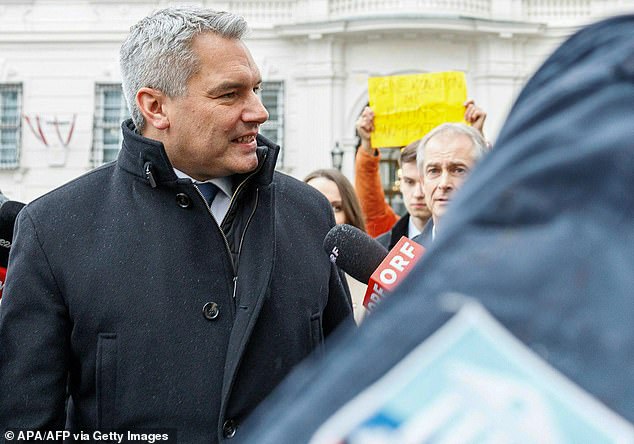Austria moved toward coalition talks led by the far-right Freedom Party on Sunday after efforts to form a government without the party failed and led to the resignation of Chancellor Karl Nehammer.
Nehammer, who announced his resignation on Saturday night, had led three and then bipartisan talks aimed at forging a centrist coalition that could serve as a bulwark against the Freedom Party (FPO) after the eurosceptic, Russia-friendly party was left. first in the vote. The parliamentary elections in September.
Nehammer’s conservative People’s Party (OVP) on Sunday named General Secretary Christian Stocker as its new leader on an interim basis.
Stocker had long repeated Nehammer’s position that the OVP would not govern with FPO leader Herbert Kickl, but said things had now changed.
‘I hope that the leader of the party with the most votes will have the task of forming a future government. “If we are invited to these (coalition) talks, we will accept this invitation,” Stocker told reporters.
“Therefore, it is not about Herbert Kickl or me, but that this country needs a stable government now and that we cannot continue to waste time on electoral campaigns or elections,” he said.
President Alexander Van der Bellen, a former leader of the left-wing Greens who has expressed reservations about Kickl becoming chancellor, angered the FPO by not asking it to form a government after the election on the grounds that no another party was willing to join him. in a coalition.
While stating that the situation had now changed, Van der Bellen stopped short of saying that he would ask Kickl to lead coalition talks. He is due to meet with Kickl on Monday at 11am and a new interim chancellor will also be named next week, while Nehammer will remain in office until then.
Karl Nehammer, who announced his resignation on Saturday night, had led three and then bipartisan talks aimed at forging a centrist coalition that could serve as a bulwark against the FPO.

Austrian Chancellor and head of the People’s Party (OeVP), Karl Nehammer, and the president of the Social Democrats, Andreas Babler, and the head of the NEOS party, Beate Meinl-Reisinger, give a press statement after coalition talks in Vienna , Austria, on December 17, 2024.

Karl Nehammer (pictured) said of talks between his conservative People’s Party and the Social Democrats: “So far we have tried everything.”
‘The voices within the People’s Party ruling out cooperation with an FPO under Herbert Kickl have become much quieter. This, in turn, means that a new path may be opening up that did not exist before,” Van der Bellen said in an address to the nation.
If Kickl is tasked with leading coalition talks, his party could secure a parliamentary majority and lead a government for the first time since it was formed in the 1950s under a leader who had been a senior SS officer. and Nazi legislator.
The failure of centrist coalition talks in Austria highlights the growing difficulty for centrist parties in many European countries to form stable governments without a far-right gaining ground.
The FPO won the September election with around 29% of the vote, and opinion polls suggest that its support has increased since then, widening its lead over the OVP and the Social Democrats to more than 10 percentage points, while its support has been reduced.
Nehammer said during and after the election campaign that his party would not govern with Kickl because he was too much of a conspiracy theorist and posed a security risk, while much of Kickl’s party was trustworthy.
The OVP and FPO overlap on several issues, particularly in their tough stance on immigration, to the point that the FPO has accused the OVP of stealing its ideas.
The two governed together from late 2017 to 2019, when a covert video scandal involving the then FPO leader caused their coalition to collapse.
The FPO stressed its message earlier on Sunday.
“Austria needs a Chancellor Kickl now,” he said on the social media platform X.


